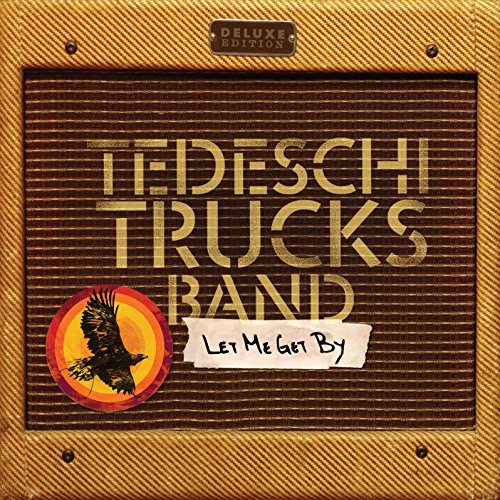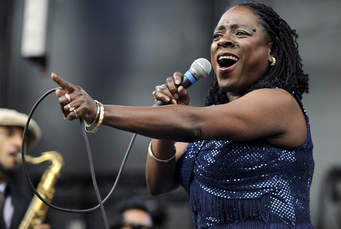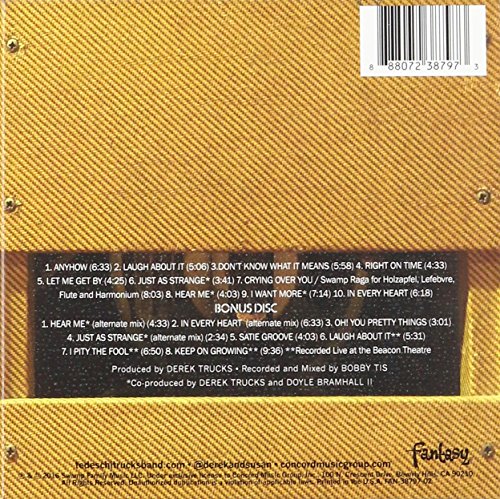
Susan Tedeschi’s soul-stirring voice soars and dips more majestically than ever, on an eagle’s wing. Listen to “Anyhow.” It’s a broken heart with tenacious muscles. Time after time, Derek Trucks’ slide guitar solos, searing and catchy, nail a song’s heart. Kofi Burbridge’s sinuously gleaming flute emerges periodically like a spectral angel. The band’s a glorious monster, like we’ve never quite experienced before. Yet there’s more, much more.
We’ve watched The Tedeschi Trucks Band grow before our eyes into the 12-musician offspring of the most blessed musical couple in American music. I’m hardly alone in thinking they’re the best performing band we have today. It’s also amazing how they become so great so fast, even while still coalescing. Their collective and individual talents have slashed through and absorbed thickets of influences, up the mountain to the roots-rock summit. Then, they reach out to pull you up with them. Their path betrays the sheer toil of inspired dedication, performing on the road for more than 200 days for the fifth straight year in 2015 — and they’re currently on another summer-long tour.
On Let Me Get By, their third studio recording, they articulate overarching purpose and meaning more clearly than ever. That statement is quite evident on the basic album, as it should be. But it becomes more fully realized in the album’s two-disc deluxe edition, which includes eight bonus tracks, three of them live concert performances, and a David Bowie cover. I’ll address the bonus material in a second post, to try getting a handle on a great collective group finding its fullest self. Remember, TTB’s reputation remains foremost as a live band, despite their Grammy for their 2011 debut studio album Revelator.

Cover of the two CD deluxe box of “Let Me Get By.” amazon.com
The new album title and cover say something like “unchain your heart!” A Mongolian golden eagle has broken free from its master’s glove, and seems bound for new heights — bound for glory, as the band put it, on a great song from Revelator.
“’Let Me Get By’ actually refers to a lot of things,” says Trucks in their website profile, “like the band becoming more self-reliant than ever before—writing our own songs and producing our own music in our own studio. It’s about moving on to a new recording label (Fantasy/Concord) with a deal that gives us more freedom.
“It definitely took time for us to get here. I think the connections we have in this band and among the crew and extended family are the real reason why.”
His spouse and band co-leader, singer/guitarist Susan Tedeschi comments, “Derek hears everything from a big picture stance. Not just track-by-track but the album as a whole.”
Adds Trucks: It’s a bunch of different true stories meshed into one.”
So much feel-good P.R. talk? Listen closely, after you’ve felt the music, and judge for yourself. The road-tested communal feeling Trucks speaks of feeds into the band’s ethical worldview, which seems more clearly crystallized on Let Me Get By. Lyricist and background singer Mike Mattison’s emergence speaks plenty about the band’s step forward. He gets his first two lead-vocal spotlights on a TTB album (on “Crying Over You” and “Right On Time”), and his increasing mastery as a lyricist and songwriter is more central than ever to the band’s vision. Despite their prodigious musicianship and Trucks “guitar hero” status, they funnel those powers into the songs, and a sense that the collective sound fuels human aspirations.
Even vocalist Tedeschi, like her spouse, seems lacking in typical leader ego. She started a kind of joke about her joy and gratitude, Trucks says. “After shows, she started to say to everyone, ‘Thanks for letting me be in your band’ and we’d all laugh. Now we all say it.”
Joy and gratitude ooze from Let Me Get By, amid more complex emotions, and as qualities that might help heal and make a difference in a deeply injured earth and troubled society.

Derek Trucks and Susan Tedeschi at Red Rocks Amphitheater in 2015. Courtesy iwebradio.fm/Kell Yeah Photography
Hear the clarion call of Tedeschi bracing opening note of “Anyhow” signaling the “wreckage in my soul”: Running from a bitter taste/took a rest from all the chase/feeling something anchored in my soul./ played the game by all the/learning lessons no one gets to choose. The song continues about a personal relationship, but that first verse can speak to anyone in the economic 99% feeling betrayed by the game and its rules — the rigged system — whether you lean left or right. The song goes on to speak of cold-hearted desperation among the unemployed and even working poor, and invokes Biblical myth: “Cain and Abel lit the flame/we can never go that way again.” This clearly references brother-on-brother crime, whether it is inner-city shootings, police brutality/homicide, or white-collar financial betrayal.
Yet “Anyhow” is an absolute soul-stirrer — not a downer. And TTB doesn’t preach, they understand the philosophic pause and the medicine of laughter, in the ensuing “Laugh About It.” This band’s ethically-driven sort of communal political synergy resonates from the rapturous gospel choruses right into the groundswell roar of the Bernie Sanders political movement, a sense of empowerment and transformation.
_____________________________
Here is The Tedeschi Trucks Band in a NPR Tiny Desk Concert, performing “Just as Strange,” “Don’t Know What it Means,” and “Anyhow” from the album “Let Me Get By”:
http://www.npr.org/2016/03/24/471725403/tedeschi-trucks-band-tiny-desk-concert
______________________________________________
The instrumental break in “Laugh About It” shows how tight and rich their grooves and arrangements have become, with Truck’s guitar quick-stepping through horn and rhythm counter-punches. You can dance along to it or your music head can marvel. And Susan does laugh about it at the end.
“Don’t Know What It Means” shows this band reaching new heights in its pop appeal, in the power of call-and-response. The refrain glows with as much warm infectiousness as a vintage Sly and the Family Stone song, another collective-oriented stylistic precursor. That refrain melody descends like the slowing last yards of an exhilarating roller coaster ride, and the rhythmic hand-clapping helps turn that dynamic into a Juneteenth Day gospel-infused parade.
The lyric continues the previous song’s laugh-it-off wound-licking: If the story feels exactly like a dream/ don’t know what it means… And you can’t just turn the page and let it go/ things that you’ve been told/ deep down in your soul.”
Rather, it’s time to strategize: “Don’t make your move too early” or you may “surely lose your way.” And the shyster or con man may be poised to snooker the unwittingly earnest. Yet TTB believes self-empowerment perseveres: Now don’t look down in the dirt/ just to find out what you’re worth… To work hard and do it right/ learn to speak up and fight/ the truth is gonna beat them down the line.”
If that sounds preachy to some, it’s hardly fire-and-brimstone browbeating. Rather, it the sort of uplift that even the ostensibly angry American black writer James Baldwin articulated in the voice of his preacher father-figure in his transformative 1962 novel Another Country. The black minister’s own son had committed suicide, yet the father counselled his congregation, all grieving his own son’s death: “Don’t lose heart, dear ones, don’t let it make you bitter, try to understand. The world’s already bitter enough. We got to try to be better than the world ‘…Except for someone — a man weeping in the front row — there was silence all over the chapel…” 1
You find no comparable moments of low-key compassion on this recording, as this band has achieved on their brilliant story-song “Midnight in Harlem.” But the new “bunch of different true stories” now mesh into a bramble-strewn path rising toward sunlight.
“Learn to speak up and fight” can mean collective song as much as righteous chants. A group of remarkably persevering protest singers in Madison, WI have assembled every noon each weekday at The Capitol building for five years — over 1,300 consecutive weekdays — to sing. The Solidarity Sing Along sustains the spirit of the original massive protests of Gov. Scott Walker’s collective bargaining-busting, anti-education Act 10 “repair bill” — which has helped decimate and polarize my home state. The Sing Along’s 60-plus song repertoire ranges from Woody Guthrie’s “This Land is Your Land” to adapted country blues classics and a Ramones song, to originals by participants. The Act 10 bill and its 100,000 protesters helped inspire Occupy Wall Street and now the Bernie Sanders “revolution.” 2
TTB’s solidarity stresses human commonality, via a collective gathering of cultural tribes, from Tedeschi’s ex-gospel choir singer-cum-blues mama roots to Trucks’ voraciously wide-ranging “big picture stance.” Trucks rose from country-blues bottleneck guitar to Allman Brothers’ band trademarks – gutsy singing, swampy blues, pealing guitar riffs for modal flights. And his Coltrane/Shankar micro-tonalities help summon this band’s patented “swamp ragas.” That simmering instrumental vocabulary facilitates exquisitely meditative introductions or segues, which help embrace a more worldly cultural vision.

Flutist-keyboardist Kofi Burbridge highlights “Swamp Raga for Holzapfel, Flute and Harmonium” on “Let Me Get By.” Courtesy Wikipedia.com
And all the band members seem attuned to the wellsprings of the blues, ‘60s-‘70s gospel and R& B, free and funk-jazz, and modern pop-rock, epitomized, of course, by the Beatles.
Which leads me to album’s next song, the slightly tipsy rollick of “Right on Time,” Mattison’s vocal seems to channel John Lennon’s gentle side, “What is it that you lack? What is it that you seek?” Then, the gently bouncing harmonized refrain: “Does a smile come alive when you share the wine..?” and a “Hey!” refrain, with woozy dance-hall horns. The whole effect, the George Martin-esque arrangement, could’ve fit right into Magical Mystery Tour or even The White Album. Heresy? So sue me.

Lyricist and backup singer Mike Mattison of Tedeschi Trucks Band gets two lead vocal spotlights on “Let Me Get By.” Courtesy pghintune.wordpress.com
For blues-rock buffs who fear they’re getting too cute, the title song is another full-throated empowerment barn burner. “Let me get by/cuz time won’t wait!” And then, they pause again, for a reality check. “Just as Strange,” co-written by Doyle Bramhall II, is a stripped-down Robert Johnson-like wail about abject craving for sex or drugs, as pure bedevilment.
Mattison’s fervent lead vocal on “Crying Over You” with the deliciously cheesy line “I caught you snooping ‘round swimming pool” segues to a lovely, haunting swamp-raga. The album’s last few songs tread in lost-romance/relationship territory, but very convincingly.
However, the final song (of the non-deluxe album), “In Every Heart,” resounds like a thematic recapitulation, blending reality and inspiration. Mellifluous horn harmonies, the ever-ready background singers, and an easy, reflective groove cue Tedeschi’s voice, honoring a warm primary influence, Bonnie Raitt. Yet “Heart” is TTB’s own statement: “In every heart there’s a name/under the perfume and the blame.” It’s about coming to terms with your true identity and your “story,” admittedly no easy task. “In every heart, there’s a song/ turning the pages… In every song, there’s a psalm/ coming to find you to sing along.”
With a surrogate family like the Tedeschi Trucks gang, one need not be alone. They deliver the power of the song. Perhaps some existentialists will call that mere sop. Me, I’d rather not stand in the rain of my spiritual solitude.
PART 2. I’ll consider the deluxe bonus disc of Let Me Get By and that 2-disc total package in another post, coming shortly.
______________________
- James Baldwin, Another Country, Vintage International, 1993, 121
2. Scott Walker, who survived a re-call election driven by the Act 10 protests, later declared, “If I can take on 100,000 protesters, I can do the same across the world,” in reference to defeating the terrorist group ISIS. The spurious analogy may have marked the beginning of the end of Walker’s short-lived presidential nomination bid. Meanwhile, he’s back in Wisconsin working his same far-right agenda and the singers continue, as they say, “until Wisconsin gets better,” as one of their mottos declares.The Solidarity Sing Along is open to anyone each weekday starting at noon at the Capitol. Their Facebook page: https://www.facebook.com/SolidaritySingAlong. At times, noted musicians have joined the participants, including Woody Guthrie’s famous son Arlo and Billy Bragg, who wrote music for and recorded unpublished Woody Guthrie lyrics in his Mermaid Avenue project with Wilco.
For the full story on the Wisconsin protests, see John Nichols’ book Uprising: How Wisconsin Renewed the Politics of Protest, from Madison to Wall Street.
“Let Me Get By” album cover at top, courtesy zumic.com
Like this:
Like Loading...









